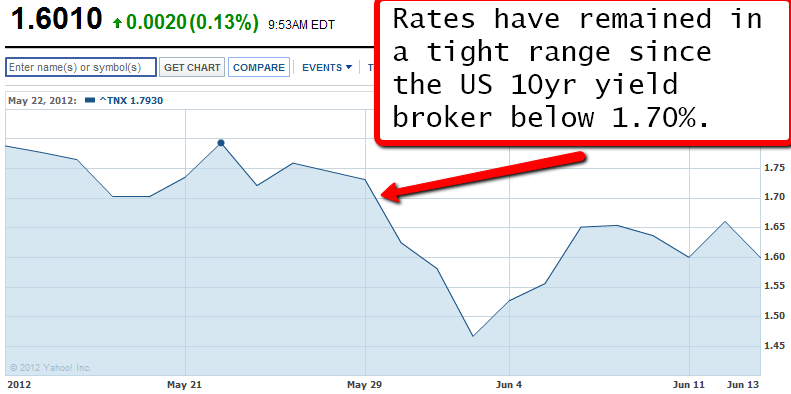Mortgage rates are basically unchanged from the beginning of the week.
Ever since the US 10-year Treasury yield fell below 1.70% in late May mortgage rates have traded within .125% of all-time low levels. Fundamentally not much has changed over the past two weeks. The European debt crisis continues to evolve and there is plenty of uncertainty that has encouraged a “flight-to-safety”, which benefits rates in the US.
Moving forward, there are three highly anticipated events coming up in the near future that will likely shape the direction of mortgage rates.
First off, this Sunday Greek citizens will head back to the polls to determine which political party will carry power as the ailing country navigates its way through its fiscal challenges. No matter which party wins it is expected that the government will try and renegotiate the terms of their bailout with European Union officials.
Second, the Fed has its regularly scheduled monetary policy meeting scheduled for next Tuesday-Wednesday. The recent slowdown in the world economy attributed to fallout from the European debt crisis has raised the expectation that the Fed will extend monetary stimulus currently set to expire at the end of this month. If the Fed does not make mention of a new plan it could cause rates to move slightly higher.
Lastly, on June 28th a summit is planned for EU leaders. Like countless summits before it’s doubtful anything meaningful will come out of this one. However, it has become increasingly clear that the only credible solution to the crisis is for Germany to agree to joint-euro bonds. Should they use this summit as a platform for such an announcement it would cause mortgage rates to rise.
It is impossible to predict how interest rates will react to the upcoming 3 events. A lack of action on the EU debt crisis could cause rates to move even lower. Conversely, if greater certainty develops regarding the fate of the global economy then I could see rates rise.
If you’re not a gambler then it would be best to lock in your rate while we know they are at all-time low levels. If you can afford the risk then it wouldn’t be a bad approach to float. Spanish government bond yields continue to climb higher increasing the likelihood that a bailout will be necessary (Spanish banks got a bailout over the weekend).
Current Outlook: neutral
